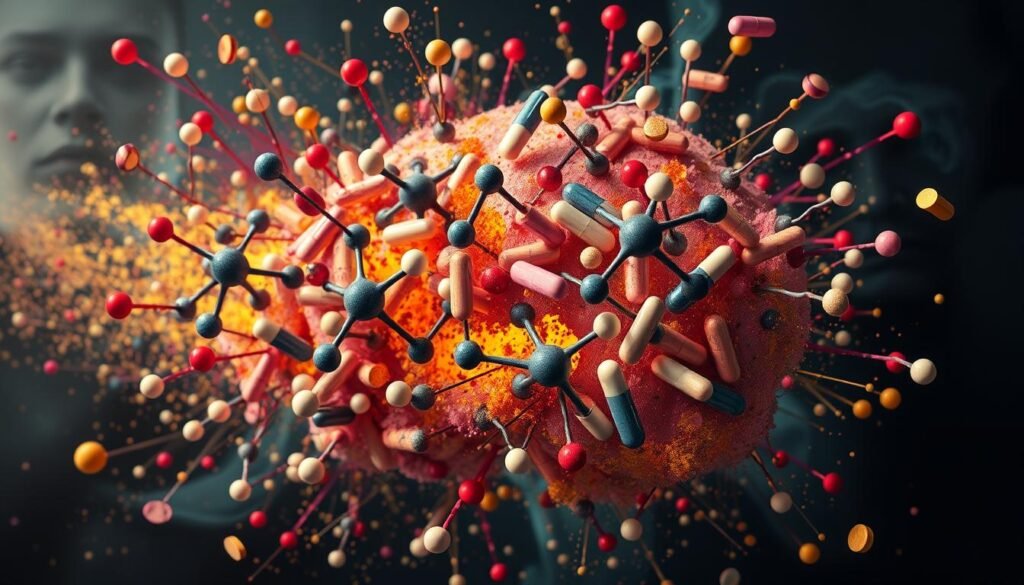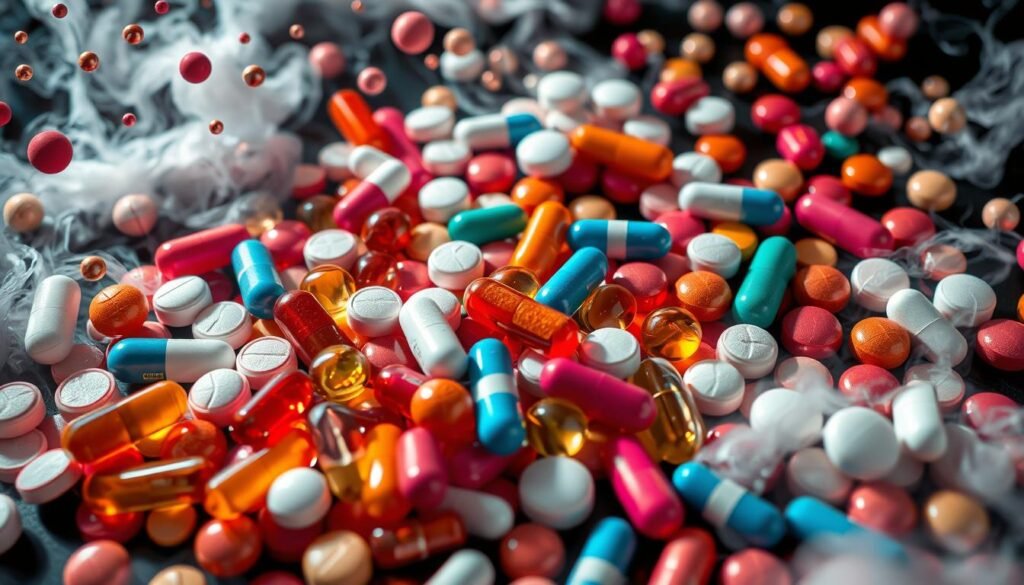Did you know serotonin syndrome impacts about 14% of people using certain drugs? This condition happens when there’s too much serotonin in the body. It’s often due to antidepressants. Symptoms can be as mild as feeling uneasy or as serious as having seizures and passing out. It’s important to know about this link to antidepressants.
Understanding serotonin syndrome is a key part of mental health awareness. By knowing the symptoms, causes, and how to prevent it, individuals can use medications safely. This knowledge helps people talk better with their doctors.
Key Takeaways
- Serotonin syndrome can occur in 14% of people on serotonergic medications.
- Symptoms can range from mild agitation to severe reactions including seizures.
- Communication with healthcare providers is vital to prevent serotonin syndrome.
- Antidepressants are common triggers, especially SSRIs and SNRIs.
- Increased dosage or combinations of medications can heighten risk.
Understanding Serotonin Syndrome
Serotonin syndrome is a serious condition caused by too much serotonin in the body. It often comes from medications like SSRIs. The serotonin syndrome definition shows it usually starts within hours after beginning a new drug, changing doses, or overdose. Symptoms range from mild to severe, so recognizing them early is key for treatment.
Definition of Serotonin Syndrome
Serotonin syndrome happens when serotonin levels get too high, mainly due to medications. People may feel agitated, confused, or, in extreme cases, have seizures and muscle stiffness. Statistics reveal SSRIs have led to serious problems for over 8,000 people, including more than 100 deaths. This highlights the importance of knowing about serotonin syndrome for patients and doctors alike.
How it Affects the Body
The impacts on the body are significant, touching many systems. The effects of serotonin syndrome include fast heart rate, high blood pressure, and shivering. In bad cases, it can bring about dangerous issues like very high body temperature and seizures. Roughly 75% of patients see symptoms within 24 hours of starting or changing their medication. Spotting these signs early is crucial for getting the right help.
Despite its severity, over 85% of doctors don’t know much about serotonin syndrome or its triggers. This gap in knowledge can be risky. That’s why it’s vital for healthcare professionals to be well-informed and watchful about serotonin toxicity.
For tips on spotting serotonin syndrome symptoms and knowing the risks, patients should check out health sites. One good resource is this link.
What is Serotonin Syndrome and How Does It Relate to Antidepressant Use?
Serotonin syndrome happens when there’s too much serotonin in the brain. This usually results from taking drugs that increase serotonin. Certain antidepressants like SSRIs, SNRIs, and MAOIs are linked to this condition. The risk rises when you mix several medications that boost serotonin.
It’s important to understand the link between serotonin syndrome and antidepressants. Combining serotonergic drugs can lead to this syndrome. It might start in hours after taking a new drug or upping the dose. Symptoms vary from mild to severe, impacting mental status, body regulation, and muscle control.
Many drugs can cause serotonin syndrome by raising serotonin or stopping its reuptake. To avoid this syndrome, watch out for drug interactions. Users of SSRIs and SNRIs should be wary of certain meds. Mixing them, especially with MAOIs, greatly increases the risk of serious serotonin syndrome.

Quickly spotting serotonin syndrome symptoms is crucial. Many resources talk about antidepressants’ side effects, including serotonin syndrome and antidepressants. Being open with your doctor about any symptom changes or medication adjustments can help lower the risks. This ensures safer treatment.
The Role of Serotonin in the Body
Serotonin has a big role in our bodies. It affects many body functions from our mood to our sleep. While most people think it’s all about the brain, about 90% of serotonin is actually in the gut. This shows its effects are more wide-ranging than many realize.
What is Serotonin?
So, what exactly is serotonin? It’s a chemical that helps nerves talk to each other. More than just a part of emotional wellbeing, it also has a big say in our physical health. Our bodies make serotonin from tryptophan, an important amino acid. Studies show that eating tryptophan-rich foods could boost serotonin levels and improve our mood.
Functions of Serotonin
The serotonin function touches many areas:
- It keeps our mood stable, helping fend off depression and anxiety.
- It controls our appetite.
- It helps us sleep well.
- It plays a part in learning and memory.
Regular exercise increases serotonin levels too. By exercising for thirty minutes five times a week and adding strength training, we might see our serotonin levels go up. This can help with mood disorders.
Medicines like SSRIs and SNRIs boost serotonin to treat depression. Knowing how serotonin and mental health are linked helps in finding the right treatment. For more on this, check out this source.

Causes of Serotonin Syndrome
It’s crucial to know why serotonin syndrome happens, especially when it comes to meds and substances. A big cause is mixing meds that up our body’s serotonin. We’ll look at meds linked to this issue, how meds can react badly together, and how illegal drugs and supplements fit in.
Medications Associated with Serotonin Toxicity
Some medications are especially linked to serotonin syndrome. Here are the key types that are risky:
- Selective Serotonin Reuptake Inhibitors (SSRIs): Medications like fluoxetine and paroxetine.
- Serotonin-Norepinephrine Reuptake Inhibitors (SNRIs): Such as venlafaxine.
- Monoamine Oxidase Inhibitors (MAOIs): Including phenelzine.
Mixing these meds with others that affect serotonin can push levels too high. This can lead to overdose.
Drug Interactions Leading to Serotonin Syndrome
Knowing about drug interactions is key to avoiding serotonin syndrome. Mixing different types of serotonin-affecting drugs can be dangerous. Mixing MAOIs with SSRIs or SNRIs is very risky.
Other risky combos include:
- Opioids like pethidine, dextromethorphan, and tramadol, which affect serotonin.
- Supplements like St. John’s wort, which boost serotonin too.
Doctors and patients must be aware of these possible dangerous interactions.
Illicit Drugs and Dietary Supplements
Illegal drugs and some supplements can also up your risk of serotonin syndrome. LSD and ecstasy, for example, raise serotonin levels. Herbal products and some supplements can be risky too. It’s vital to know that mixing these with serotonin meds can cause big problems.

| Medication/Substance | Classification | Risk Level for Serotonin Syndrome |
|---|---|---|
| Fluoxetine | SSRI | High |
| Venlafaxine | SNRI | High |
| Phenelzine | MAOI | Very High |
| Pethidine | Opioid | High |
| Dextromethorphan | Opioid | High |
| St. John’s Wort | Dietary Supplement | Moderate |
| LSD | Illicit Drug | High |
| Ecstasy | Illicit Drug | High |
Symptoms of Serotonin Syndrome
It’s crucial to recognize the symptoms of serotonin syndrome for quick action. Knowing the difference between mild and severe symptoms is key. This know-how improves health outcomes, especially with medication changes.
Mild Symptoms
Mild symptoms can show within hours of a new medication or a dosage change. These early signs include:
- Agitation
- Shivering
- Diarrhea
- Rapid heart rate
- Hallucinations
Spotting these early can stop the condition from getting worse. It may also lower the risks of serotonin toxicity.
Severe Symptoms
Severe symptoms can indicate serotonin syndrome has escalated. Important signs to watch for include:
- High fever
- Severe muscle rigidity
- Seizures
- Unconsciousness
- Irregular heartbeat
Knowing these emergency signs is critical. They can mean a life-threatening situation that needs fast treatment.
When to Seek Medical Attention
If you think you have serotonin syndrome, especially after medication changes, get medical help quickly. Emergency care for serotonin syndrome is crucial, especially with severe symptoms. Quick treatment greatly boosts recovery chances. This underscores the need for speedy action when symptoms show.
Diagnosis and Management of Serotonin Syndrome
Doctors diagnose serotonin syndrome using several methods. They look for signs that suggest too much serotonin. There isn’t just one test that can tell if someone has it. Instead, doctors use different tests to make sure nothing else is causing the symptoms.
How is Serotonin Syndrome Diagnosed?
Doctors start by looking at the patient’s medical history and doing a physical check. They look for signs of confusion, problems with the body’s automatic functions, and muscle issues. They might do tests like:
| Test Type | Purpose |
|---|---|
| Blood Tests | To assess overall health and identify any underlying issues. |
| Urine Tests | To check for the presence of drugs or toxins. |
| Chest X-ray | To evaluate lung condition and rule out respiratory issues. |
| CT Scan | To investigate any brain abnormalities. |
| Spinal Tap (Lumbar Puncture) | To examine cerebrospinal fluid for infections or other conditions. |
Treatment Options Available
If someone has serotonin syndrome, doctors stop any medicines raising serotonin levels. They give care based on how serious the symptoms are. Patients might need help with staying hydrated, breathing well, and keeping vital signs stable. Severe cases need hospital care. Treatments include:
- Administration of muscle relaxants
- Use of serotonin antagonists, such as cyproheptadine
- Intravenous fluids to maintain hydration
- Medications to manage heart rate and blood pressure
- In dire situations, interventions like a breathing tube or muscle paralysis may be necessary.
Less severe serotonin syndrome usually gets better in 24 to 72 hours after stopping the medicine causing it. But keep in mind, symptoms from some antidepressants might last longer. If the symptoms worry you, get emergency help right away.
Preventing Serotonin Syndrome
Preventing serotonin syndrome is key for safe medication use, especially with antidepressants. A careful plan for managing meds boosts education and safety. It’s vital to communicate well with doctors about treatments to avoid this condition.
Medication Safety Practices
Following safety steps is critical with serotonergic medications. Key strategies include:
- Careful monitoring of all prescribed medications.
- Strict adherence to dosages as prescribed by healthcare providers.
- Avoiding the combination of serotonergic medications unless directed by a doctor.
- Maintaining a medication list that includes over-the-counter drugs and supplements.
Knowing early signs of serotonin syndrome is empowering. It shows why being open about meds with doctors is crucial.
Importance of Communication with Healthcare Providers
Open talks with healthcare providers build a solid relationship. Vital parts of this include:
- Discussing all medications, including any recent changes in dosage or new drugs added to the regimen.
- Informing providers of over-the-counter medications and dietary supplements taken concurrently.
- Reporting any new symptoms or changes in health status promptly.
This communication prevents serotonin syndrome. By being open, patients boost their safety and partner with doctors against risks.
Understanding Antidepressant Side Effects
Antidepressants help with many mental health issues. But it’s key to know antidepressant side effects. Knowing what to expect helps patients stick to their treatment plans.
Common Side Effects of Antidepressants
Common side effects include:
- Nausea
- Weight gain
- Agitation
- Dizziness
- Sleep disturbances
- Changes in appetite
- Sexual dysfunction
Elderly folks might face more issues, like hyponatremia. This causes dangerous fluid buildup. Spotting these signs is crucial for safety and helps doctors manage risks.
Specific Risks Associated with SSRIs and SNRIs
SSRIs and SNRIs are effective but have SSRIs risks and SNRIs effects. They might lead to serotonin syndrome. This is serious and happens when they’re mixed with other serotonergic agents. Symptoms include confusion, agitation, and muscle twitching. It’s important to recognize these serotonin syndrome risk factors.
Dealing with these risks means doctors and patients must talk clearly. Regular meetings and detailed side effect info improve antidepressant safety.
Conclusion
Knowing about serotonin syndrome is very important for those using antidepressants. This serious problem can happen when serotonin goes up because of drugs like SSRIs. It’s key to know the signs, like being agitated or confused, early on when starting or changing doses.
Family doctors have a big role in spotting and treating serotonin syndrome. They must prescribe drugs safely and talk openly with their patients. This way, they help lower the risks of antidepressants. This ensures patients get the best, safest treatment.
It’s key for both doctors and patients to keep learning about serotonin syndrome. By being careful and discussing treatment options, they can handle antidepressant treatments safely. For more info, see understanding serotonin syndrome and how it affects mental health.